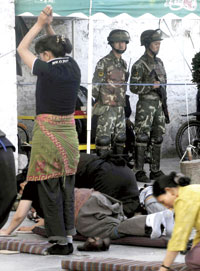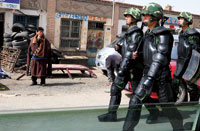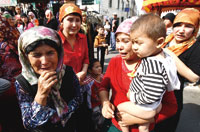The Future of Japan and China – Part 1
Is this really what awaits Japan in the near future?
What is happenning after a Chinese invasion in Mongolia, Uighur and Tibet?
Religion

Armed police monitoring a Tibetan temple. Photograph: Jiji
The Chinese government will choose religious leaders like priests and pastors. Observers will constantly keep an eye on temples and churches, and spy on any conversations between those entering and leaving the building. It will be possible to recite sutras, but it will no longer be permitted to explain their meaning. In Tibet, it is illegal to possess pictures of the Dalai Lama. In Uighur, during Ramadan, the Muslim month of fasting, free lunches are forced upon people, and the police clamp down on anybody who tries to fast.
Economy
Businesses entertaining close ties with the Chinese government or with Chinese businesses will be given preferential treatment. Businesses and individuals that do not agree with the Chinese government and anybody entertaining relations with them will be ostracized, and anybody who opposes the Chinese government will not be able to engage in any kind of business activity. In order to travel, permission from the Chinese government will be needed, but in reality, permission to travel will almost never be given. The majority of the population in Inner Mongolia is Han Chinese, with a substantial Mongol minority. Recently, Mongol minority has been barred from becoming public servants or company employees. Exchange students coming to Japan from Inner Mongolia are often referred to as “Refugee Students”.
Education
From primary school to university, the use of mother language will be banned, and teachers of that country will no longer be able to work. Teachers will be chosen by the communists and teach classes in Chinese. Of course religious and indigenous cultural education will be banned. Even if somebody were to study mother language, it would be useless for their further study and employment, so the young generation will not study it. In Tibet, there are households in which the parents are Tibetan, but their children cannot speak Tibetan. Also some parents have to serve as interpreters if grandparents want to communicate with their grandchildren, creating an even vaster gap between generations.
Society

Armed police zooming in on anti-government movement. Photograph: EPA=Jiji
Chinese criminals are sent to Chinese autonomous regions and forced to do hard manual labor. Native women from the autonomous regions, on the other hand, are forced to move to mainland China and marry Chinese men (Han people). Under the pretext of building local infrastructure, the Chinese will send “Production and Building Corps” consisting mainly of war veterans to the autonomous regions. These are actually military units dispatched to crack down on local independence movements.
Media
All newspapers, TV channels, and radio stations will be put under surveillance, and all their content will be subject to censorship. No criticism of the Chinese government will be permitted. The media will gradually start using more and more Chinese, and people who do not understand Chinese will have no access to information. Also, foreign journalists will be barred from entering the country to prevent information about the Chinese authorities’ oppression of the region from leaking abroad.
Spying and Surveillance

Uighur women crying in protest against severe oppression. Photograph: EPA=Jiji
If anybody says or does anything against the government, that person will be placed under surveillance. Whoever gets staged and is branded a “criminal” will be yelled and jeered at in public, dragged around town, or executed. Bystanders are forced to jeer at the “criminal”. Those who refuse receive the same punishment. Even couples and family members are forced to criticize and spy on each other. If a Tibetan gets caught participating in anti-government activity, his family members are forced to watch his execution and pay the fees incurred by it.
★ ★ ★
After WWII, China abused waves of international unrest to invade Inner Mongolia (Southern Mongolia) in 1947 , Xinjiang Uighur (East Turkestan) in 1955, and Tibet in 1965, turning them into autonomous regions of China.
They told all of them the same story: “We guarantee that you remain autonomous” and “We will grant you freedom of religion and freedom of speech”. Then, once they had established a sufficient level of police and military control, they moved on to subdue them with military force.
China’s rule of fear
So what exactly does the Chinese government do to its autonomous regions? First, they undermine the authority of the leading strata of regions’ society and get rid of them. They nurture fear in people’s hearts by conducting public executions, destroying their drive to resist. They control newspapers, TV, and radio broadcasts and practice censorship. They control any information that gets published, and make sure it contains nothing to inconvenience the Chinese authorities.
Secret surveillance activities are especially terrifying. The Chinese officials regularly force people in neighborhoods and workplaces to spy on their fellow countrymen. If they refuse, they themselves get punished. In this system, even your child, your mother, your brother, your friend, or your colleague may be spying on you, and you never know who will criticize you. People become hopelessly paranoid.
In short, a rule of fear is enforced in all of China’s autonomous regions.
As China is a state of materialism and atheism, it views religion as an enemy. Taking away the fundamental right to freedom of religion also leads to the loss of freedom of speech, freedom of the press, freedom of assembly and any other type of freedom.
In order to prevent Japan from meeting such a cruel fate, we need to work with the international community and bring about China’s democratization.


















